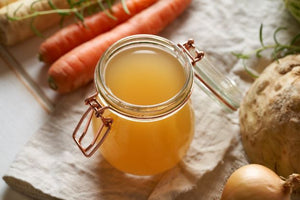
Collagen is a hot wellness topic, with seemingly everyone taking some kind of supplement. Claims for taking collagen include glowing and youthful skin, vanishing joint pain, and better sleep.
But is a supplement really necessary?
If you’ve heard about the benefits of collagen and you’re thinking about trying a supplement, you should also think about some ways you can increase collagen production naturally.
What Does Collagen Do?
You’ve probably seen collagen supplements on shelves in the health section at your grocery store. Before it became a popular supplement, it was pretty rare to hear anything about it.
However, that doesn’t mean collagen isn’t extremely important. It’s a type of protein that your body actually makes itself. In fact, it’s the most abundant type, making up around a third of the total protein in your body.
It’s main job is to provide structure in various tissues of the body. There are several types with slightly different functions. Collagen is found in the:
- Skin
- Muscles
- Bone
- Tendons
- Ligaments
So basically, everywhere in the body. Here are some of the benefits:
Skin health - Collagen keeps the skin firm and supple, which helps to prevent signs of aging, like wrinkles. It’s also important for wound healing.
Joint health - It strengthens the joints, preventing aches and pains caused by overuse, aging, and diseases like arthritis.
Gut health - one of the lesser known, but equally important benefits of collagen. Collagen is a major structural component of the lining of the gut, which is made of smooth muscle. Strengthening this barrier improves digestion, inflammation and immune function.
Bone health - collagen contributes to bone mineral density, which is important for preventing osteoporosis.

Sleep - collagen is a great source of glycine, an amino acid that helps with sleep. Glycine also functions as a neurotransmitter that helps you fall asleep and stay asleep.
Body composition - collagen increases strength and muscle mass, and can help prevent muscle wasting caused by aging.
Collagen Decreases with Age
Many processes slow down as we age, including collagen production. Not only does our body just start making less, but the quality of collagen also decreases.
As collagen production slows, we start to see signs of aging like wrinkles, thin, fragile skin, and achy joints.
But here’s what’s shocking - some claim that this can actually start happening as early as 30 years old. This is one reason behind the recent trend in supplements, especially in the beauty industry. People are desperately trying to get ahead of aging, and beauty companies have definitely caught on.
Other Factors That Damage Collagen
Certain lifestyle habits can actually damage collagen and its production in the body.
First, sun exposure. UV rays from the sun are thought to speed up collagen damage in the skin. The areas most exposed to the sun, like the face and hands, are likely to show signs of aging sooner than other parts of the body.
Next, smoking. Smoking exposes the body to an insane amount of free radicals, decreases vitamin C in the cells, triggers an inflammatory response, and therefore disrupts collagen production.
Finally, your diet. Excessive sugar and fat intake have been linked to poor collagen production, inflammation, and increased signs of aging.
How to Increase Collagen Production Naturally

Just as your lifestyle can damage collagen production, there are a few things you can do to support healthy collagen production without taking a supplement.
First, you should of course limit damaging factors like sun exposure, smoking, and excess sugar.
Next, take a deeper look at your diet and make sure you’re eating plenty of foods that increase collagen production naturally. You should be eating plenty of high-quality protein, such as meat, poultry, fish, dairy, and eggs.
Although plant-based protein sources can help with collagen synthesis as well, animal protein is more effective because of its amino acid content - specifically, proline and glycine. These amino acids are extremely important for collagen production.
However, there are some plant-based proline sources, like barley, wheat, and sorghum. You can also supplement proline.
Bone Broth for Collagen Production

If you really want to boost collagen in your body, consider drinking bone broth on a regular basis. Bone broth is made by simmering animal bones and connective tissue for several hours.
The result is an extremely nutrient-dense stock that contains amino acids, omega-3 fatty acids, and a long list of vitamins and minerals.
Our bone broth protein powder is sourced from European beef bones, resulting in an extremely high-quality bone broth full of amino acids.
Drinking bone broth is one of the easiest ways you can boost proline and glycine in the diet, and therefore boost collagen production.
Other Important Nutrients
Collagen production is a process that requires more than just amino acids. Some other important nutrients that make this happen include vitamin C, zinc and copper. Luckily, it’s pretty easy to get plenty of these nutrients from food. Here are some sources of each:
Vitamin C - citrus fruits, leafy greens, bell pepper, and tomatoes.
Zinc - meat, fish, dairy, eggs, legumes, nuts, and seeds.
Copper - whole grains, legumes, nuts, organ meats, dark leafy greens, and cocoa.
If you’re eating a generally healthy diet with limited processed foods, you’re probably getting plenty of these nutrients.
Final Thoughts
Collagen production naturally decreases as we age. That process can be expedited by certain lifestyle factors like UV exposure, smoking, and poor diet.
Although taking a collagen supplement is a popular trend for multiple wellness reasons, it may not be necessary for everyone. Some may find it more convenient and beneficial to make lifestyle changes in order to increase collagen production naturally.








